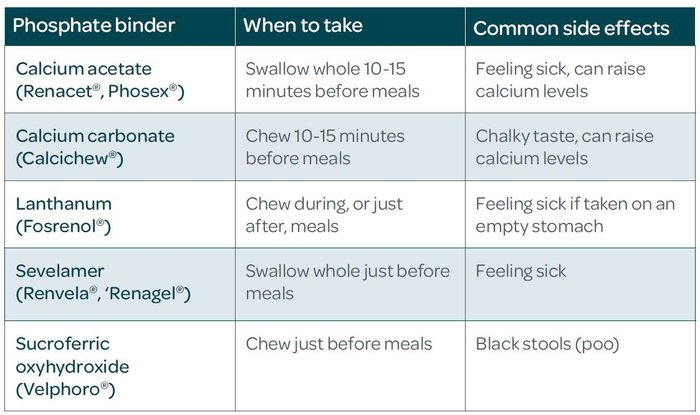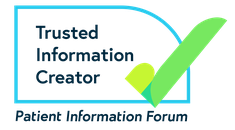Medicines can be used to help manage conditions associated with chronic kidney disease (CKD), which include anaemia and mineral bone disease. This page gives you more information about your medicines and some of the possible side effects. For more information, ask your doctor, pharmacist or dietitian.
What do the medicine names mean?
Most medicines have two names: the real (drug) name and the brand (company) name.
On this page, the brand name will be indicated by the use of a capital first letter and a registered trademark symbol ® – like Renacet®. Doctors tend to use the real name of the drug.
What types of medicines might I need?
Some of the most common medicines that you may be prescribed include:
Medicines that treat mineral renal bone disease
Medicines to help to stop phosphate being absorbed from your diet:

Note: these medicines should be taken when you eat foods containing phosphate. Your dietitian or healthcare professional will talk to you about avoiding phosphate-rich foods. Don’t take antibiotics or iron tablets at the same time as your phosphate binders, as this will stop them from working.
Other medicines to help with renal bone disease
- Vitamin D tablets – alfacalcidol, calcitriol, and paricalcitol. These help to balance your calcium levels and control your parathyroid hormone (PTH) level. They are usually taken once a day, or three times a week, after haemodialysis. Note: these medicines can also cause the calcium level in the blood to rise. Side effects also include feeling sick – try taking with food. These are not the same as the vitamin D supplements you get from the chemist as they are specially made for kidney patients.
- Cinacalcet. This is a medicine for patients with very high levels of parathyroid hormone who are not able to have a parathyroidectomy operation. It is used to bring down the parathyroid hormone level in your blood. This drug has the advantage of not raising calcium levels, but levels still need to be monitored. Side effects include feeling sick and abdominal pain. It is best taken with food. Etelcalcitide is an intravenous (given straight into your blood stream) version of cinacalcet which may be used if you can’t take cinacalcet.
Medicines that treat anaemia
Many patients with kidney failure have a condition called anaemia. This means they have a lack of red blood cells in their body.
Red blood cells carry oxygen around the body. Your kidneys help the production of red blood cells in the body by making a substance called erythropoietin (EPO). When your kidneys do not work, they produce less EPO and you also absorb less iron from your food. This can make you anaemic which can make you feel very tired.
- Iron tablets can be taken, for example ferrous (iron) sulphate tablets. These are often taken three times a day. Side effects include indigestion, black stools (poo) and feeling sick. If they make you feel sick, try taking them with meals. Do not take at the same time as some antibiotics and calcium tablets. If your poo suddenly becomes very black, tell your doctor.
- Iron injections. Iron can be given into your bloodstream if you cannot take it by mouth, or are on dialysis. Venofer®, Diafer® and Monofer® are types of iron injections. Rarely, people can have an allergic reaction to iron, which can be serious. People also sometimes get a metallic taste in their mouth.
- EPO or erythropoietin stimulating agents (ESA) injections (for example Eprex®, NeoRecormon®, Aranesp®) can be given as an injection under the skin, or directly into your bloodstream on dialysis. The dose can vary from three times a week, to once a month. They can cause your blood pressure to go up, so this will be monitored by your doctor.
- HIF-PH inhibitors, such as roxadustat and dapradustat, increase production of red blood cells and levels of haemoglobin in the blood. They are usually given as tablets.
Looking after your medicines
You should store your medicines in their original packet in a cool, dry place, out of the sight and reach of children.
Do not get rid of any expired or unwanted tablets by flushing them down the toilet or throwing them away. Take them to your local pharmacy who will dispose of them for you.
Always consult your GP, kidney doctor or pharmacist before changing or starting any medications.
Specific information on different types of medications can be found on our website and in our patient information leaflets or on the NHS Medicines A to Z website.
Medicines for anaemia and mineral bone disease: download or order Kidney Care UK's information leaflet
You can download our Medicines for anaemia and mineral bone disease leaflet for free.
You can also order a printed copy of Kidney Care UK’s Medicines for anaemia and mineral bone disease leaflet to be sent to you in the post.

Publication date: 07/2023
Review date: 07/2026
This resource was produced according to PIF TICK standards. PIF TICK is the UK’s only assessed quality mark for print and online health and care information. Kidney Care UK is PIF TICK accredited.